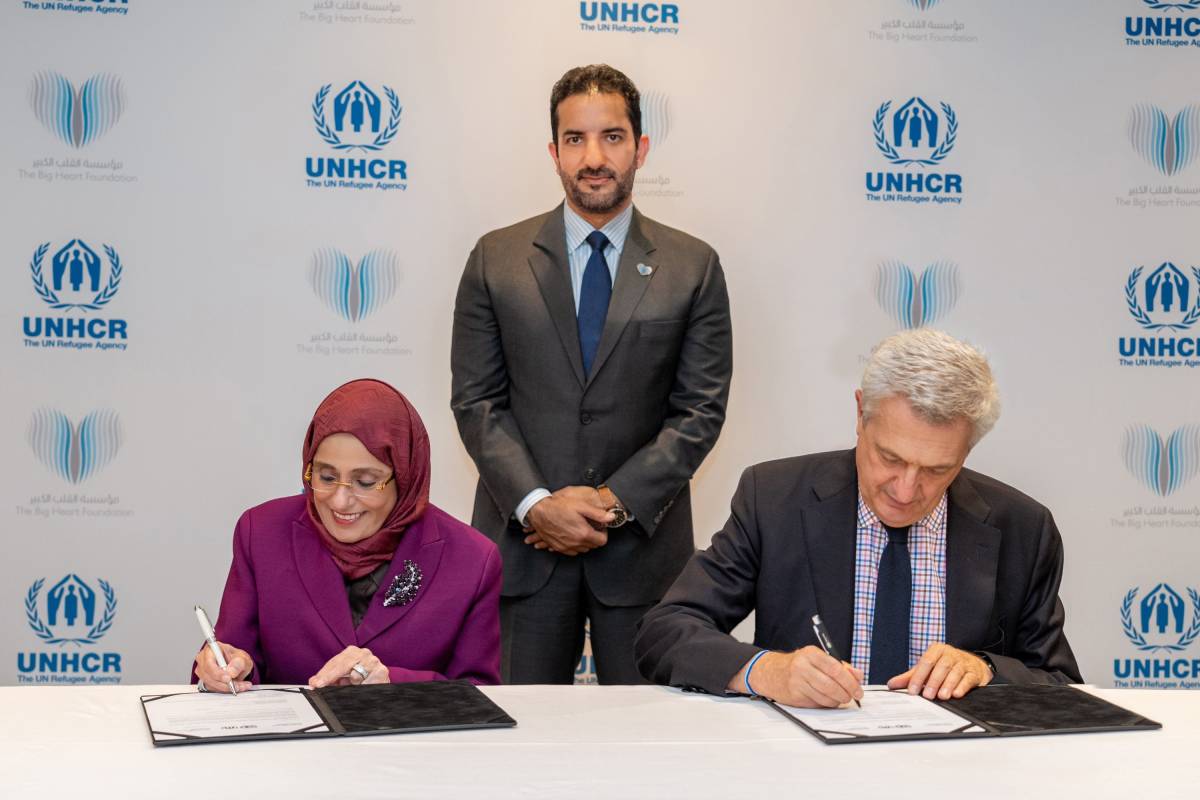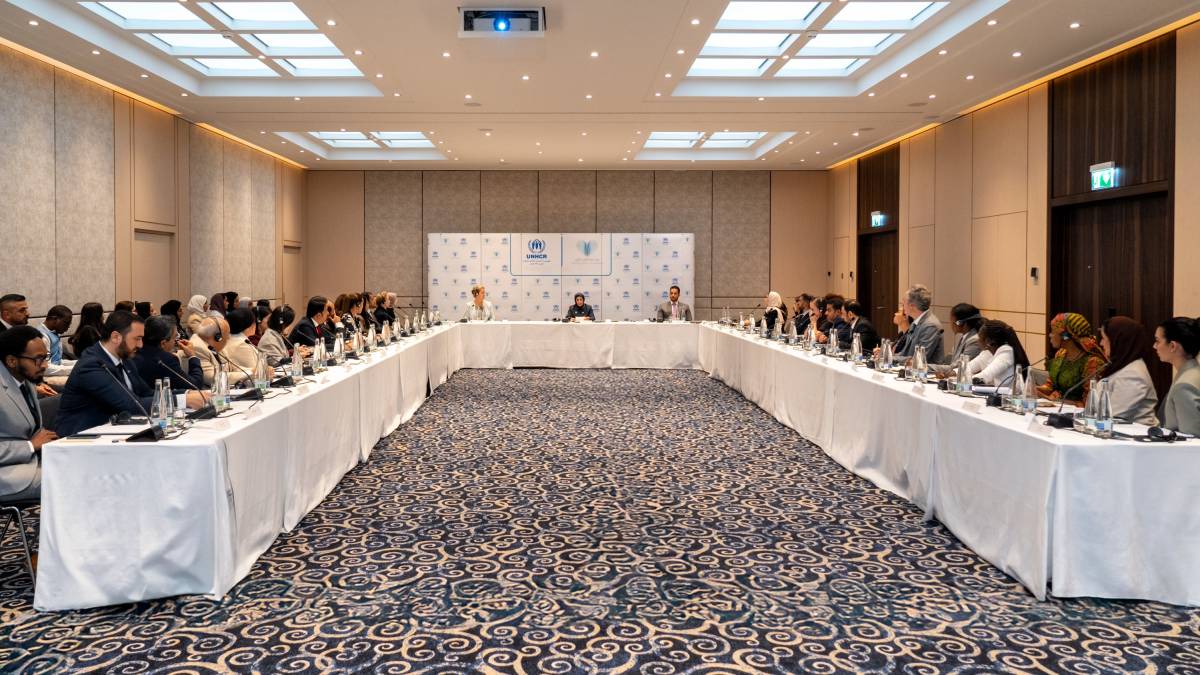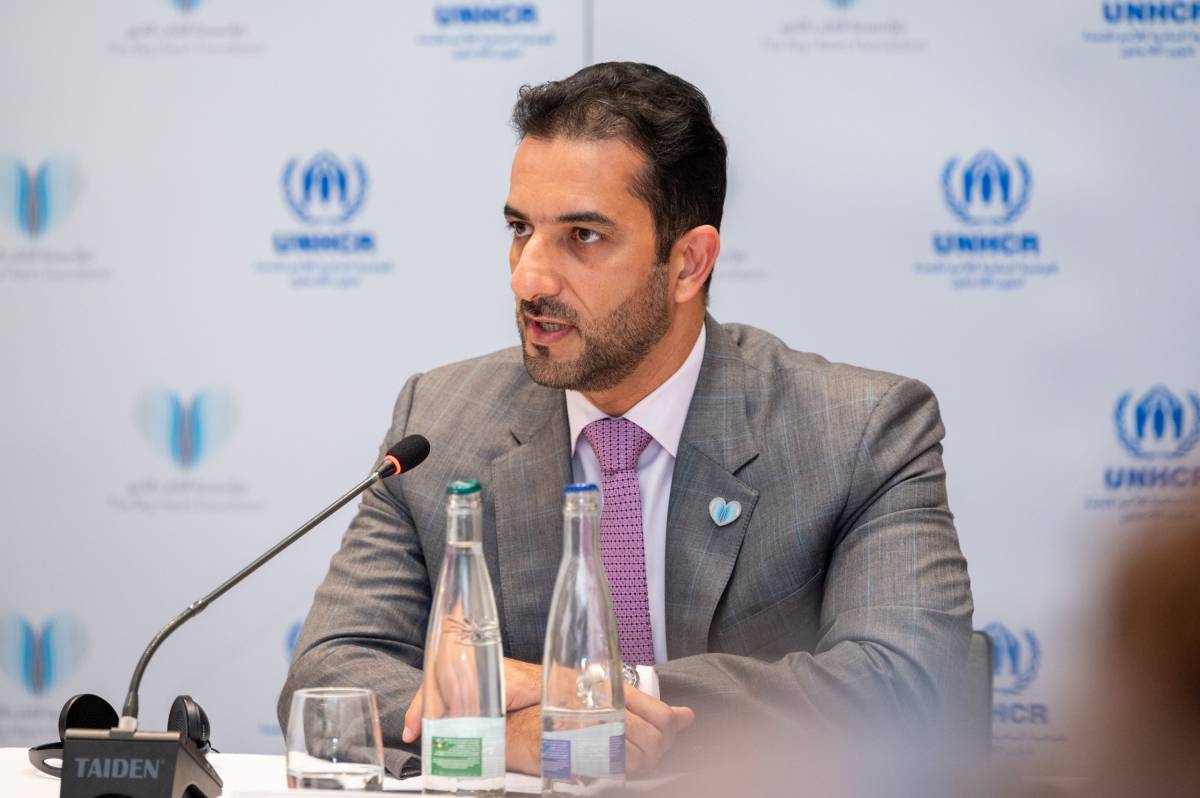UNHCR renews Sheikha Jawaher’s title as Eminent Advocate for Refugee Children
Sharjah's deputy ruler vows to champion a just and secure world, where care and humanity lead future generations.

SHARJAH/GENEVA: The United Nations High Commissioner for Refugees (UNHCR) has announced that Sheikha Jawaher bint Mohammed Al Qasimi, wife of the Ruler of Sharjah and Chairperson of The Big Heart Foundation (TBHF), has renewed her title as UNHCR Eminent Advocate for Refugee Children for the next two years.
Her commitment, which has spanned more than a decade, continues to focus on improving the lives of millions of refugee children worldwide, especially in conflict zones like Palestine, Lebanon, and Sudan.
In a solemn ceremony in Geneva, Filippo Grandi, the United Nations High Commissioner for Refugees, highlighted Sheikha Jawaher’s relentless efforts and dedication over the past decade as key reasons for this renewal. "Her Highness [Sheikha Jawaher] has been a true champion for refugee children, ensuring their safety, dignity, and future are prioritised," said Grandi.
"Her commitment to sustainable humanitarian development has been transformative, providing life-saving support and advocating for the most vulnerable."

How does Sheikha Jawaher support refugee children?
Since being named the first-ever UNHCR Eminent Advocate for Refugee Children in 2013, Sheikha Jawaher has launched initiatives ranging from emergency relief campaigns to long-term development projects. These initiatives have benefited millions of children, young people, and displaced families. During the ceremony, Sheikha Jawaher reaffirmed her dedication: “I have been committed to my mission as an advocate for refugee children for the past ten years, and I am honoured to renew that commitment for the next two years.”
Alongside the renewal ceremony, the TBHF and UNHCR hosted a panel discussion, “Leadership in Change: Education and Empowerment for Refugees in Africa,” focusing on the challenges faced by refugees in Africa, particularly in Malawi, Eswatini, and South Africa, including barriers to education and empowerment. The event brought together global humanitarian leaders – including Sheikh Sultan bin Ahmed Al Qasimi; Dr. Hessa Abdullah Al Otaiba, the UAE Ambassador to the Swiss Confederation; as well as representatives from government bodies, private companies in Sharjah, diplomats and international humanitarian organisations from Asia, Africa, Europe, and America.
“Education is the cornerstone of a better future for these children, and our collective responsibility is to ensure they receive it,” Sheikha Jawaher said during the acceptance speech. “It is my duty, and our collective duty, to confront one of the most urgent challenges of our time: the human suffering that burdens millions across the globe.
“These millions are the real heroes, and we are blessed by God to be a part of their stories—to be among those who seek to bring about positive change in their lives. In striving to ease their suffering, we discover our own humanity and the true purpose of our existence. This goes beyond the titles, positions, and roles we hold,” she continued.

Which countries are most impacted by refugee crises?
During her discussions with the UNHCR, Sheikha Jawaher underscored the humanitarian crises in Palestine, Lebanon, and Sudan, where conflict has severely impacted refugee populations.
“As we gather here today, the world is witnessing suffering on a scale unseen since the Second World War. In Palestine, wounds have been bleeding for decades. Just a few days ago, in Gaza and in full view of the world, children, women, and displaced patients were burned in the tents they had sought refuge in after everything in their cities was destroyed. No justification in this world allows any entity to harm even a single child, let alone displace, starve, burn, or kill them, robbing them of everything needed just to survive!” she remarked.
“We cannot attach the term ‘children’ to any identity or nationality in the law of humanity. It is inhumane to say ‘the children of Palestine,’ ‘the children of China,’ or ‘the children of UAE’ or ‘the children of France’—all the children of the world are our children! In Lebanon, tens of thousands of families are displaced daily, and their numbers have surpassed one million in just a few months. In Sudan, and in many other countries, the tragedies are beyond words,” Sheikha Jawaher further noted.
How has Jawaher Al Qasimi's advocacy made a difference?
Over the years, Sheikha Jawaher’s humanitarian efforts have reached over six million people in refugee, displaced, and vulnerable communities. She has been particularly focused on supporting women, girls, and children—groups most affected by conflicts. "Each day, we lose doctors, teachers, and artists— people with visions to change the world," she remarked. "Yet, in their suffering, they provide powerful lessons about resilience.
“Their ability to stand strong inspires us to honour their voices and do whatever we can to support them. Day after day, thousands of families, women, children and the elderly are stripped of every last of their human rights. They become refugees, displaced and victims in an instant. Yet, no matter how dire the situation, we will never accept this as the new normal.”
Commenting on the role of organisations and official entities and individuals towards victims, refugees and the displaced, she said: “Refugees are not just numbers in a headline. They are mothers, fathers and children. Children forced to grow up overnight, children with no playgrounds to play in or schools to go to, children who are trafficked and abused. Children we have collectively failed, who continue to endure and smile.”
As Sheikha Jawaher Al Qasimi continues her role as UNHCR Eminent Advocate for Refugee Children, she remains committed to advancing long-term solutions, especially in education and empowerment. Her closing remarks reflect her hope for the future: “I hope that the next time we meet, it will be in a world that is more just, secure, and stable; one where care and humanity are the guiding light for generations to come.”

Humanity is in ‘our Arab and Islamic culture’
During his keynote speech, Sheikh Sultan Bin Ahmed Al Qasimi, said: “This title is a role and a responsibility that 47 million refugee children residing in our world today have entrusted Her Highness [Sheikha Jawaher] with, and they could not have selected a better advocate”.
“In our Arab and Islamic culture, and particularly in the Emirate of Sharjah, we take great pride in the values embodied by our leaders. We have learned from Sheikh Dr Sultan bin Mohammed Al Qasimi, Member of the Supreme Council and Ruler of Sharjah, that building people and their capabilities is the most important achievement”, he added.
Sheikh Sultan called on businesses and institutions in both the private and the public sector to embed humanitarian work in their policies and programmes.
The High Commissioner concluded the ceremony by presenting Sheikha Jawaher Al Qasimi with the UNHCR’s Eminent Advocate Plaque.